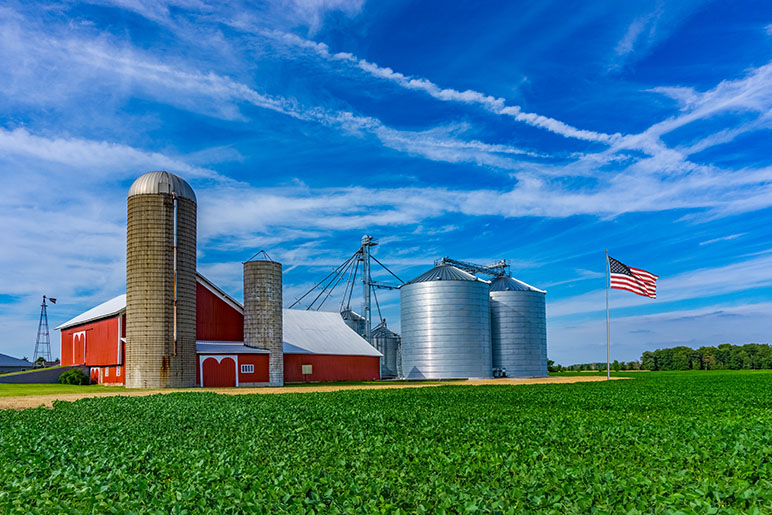bf1e605e32056b8a9f2eff03000bf66e.jpg?sfvrsn=721b0bba_0)
MEET THE AGENCY
bf1e605e32056b8a9f2eff03000bf66e.jpg?sfvrsn=721b0bba_0)
Inside Story

Farming is one of the oldest and noblest professions, but it is also one of the most dangerous. According to the Purdue University Agricultural Safety and Health Program, approximately one in nine Indiana farms has a farm-work-related injury that requires medical attention each year. With all the duties that go with running a farm, it can be easy to forget about hazards that can cause accidents, injuries or even death. National Farm Safety and Health Week is a great opportunity to focus on farm safety, help reduce accidents and keep you, your family and employees safe and productive.
These helpful tips offer guidance on how to safely operate your farm.
Are buildings, work areas and walkways free of trash, clutter or tools that can cause someone to trip and fall?
Do all tools and equipment have guards and shields in place?
Are all power cords in good working order with a proper grounding?
Are “No Smoking" signs displayed near fuel storage areas?
Are fire extinguishers accessible in all buildings?
Are fire extinguishers inspected annually and in working order?
Are electrical fuse boxes accessible and properly labeled?
Are slow-moving vehicle (SMV) triangles properly installed, clean and visible?
Do all tractors have a rollover protective structure (ROPS) installed?
Are seat belts always used when available?
Are all headlights, flashers and warning lights in good working order?
Are all guards and shields in place?
Do all tractors and vehicles have a fire extinguisher?
Are all keys removed from tractors, trucks and equipment when not in use?
Are all farm workers required to wear gloves and non-slip footwear while performing farming activities?
Are helmets, safety harnesses, masks/respirators and ear protection accessible to family members and employees?
Is all farm personal protective equipment (PPE) properly maintained?
Are farm workers prohibited from wearing loose or baggy clothing when working around equipment?
Are there specific areas for children to play in and not to play in?
Never allow children to ride on tractors or machinery.
Do you keep children away from hazardous areas such as grain bins, chemical storage areas and livestock housing?
Are children taught farm safety practices from an early age?
Are all shields and guards in place on grain handling equipment?
Are all ladders and platforms properly secured and free of debris?
Is a lifeline and harness available when working inside a grain bin?
Is there a process to ensure that all equipment has been shut off or secured before entering a grain bin?
Is a dust mask or respirator available to use when entering a grain bin?
Do the grain bins have “Do Not Enter” signs posted on them?
Are there rescue resources available if a person becomes entrapped?
Are fences used to contain livestock regularly checked and maintained?
Are all gates in proper working order and well maintained?
Are immunizations current for all animals, including pets?
Is newly stored hay monitored for possible overheating?
Are needles, knife blades and syringes properly disposed of?
Are important emergency numbers posted?
Does the farm have an emergency preparedness plan?
Do local first responders have a copy of the farm’s emergency plan?
Is anyone on the farm trained in first aid and CPR?
Are there well maintained first aid kits located in buildings and vehicles?
Get adequate rest.
Take breaks when necessary.
Stay hydrated.
Avoid alcohol.
Avoid distractions, especially cell phones, when operating equipment.
Eat balanced, regular meals.
Ask for help if you need it.
Indiana Farm Bureau Insurance supports National Farm Safety and Health Week and believes farm safety is important for all types and sizes of farms across Indiana. Indiana Farm Bureau Insurance understands the importance of farm safety; your farm and its safety are important to us. We will partner with you to provide education, resources and expertise to identify and reduce farm hazards. You can also receive guidance on how to improve overall farm safety and risk management. Please contact your local Indiana Farm Bureau Insurance agent to learn more.
Risks are still present even if you practice farm safety. To help address these risks, our farm and crop insurance is a great tool to help protect your farm, family and livelihood. Indiana Farm Bureau Insurance has farm insurance options that can provide coverage for your liability, farm structures, home, livestock, machinery and farm vehicles. Along with providing coverage for your property, our crop insurance can provide protection for your farm’s income against the effects of crop loss. Our crop insurance policies can assist in covering most losses due to hail, fire, lightning, vandalism and some transporting accidents.
For more information regarding farm and crop insurance, contact a local Indiana Farm Bureau Insurance agent today. They can help answer any questions you may have about the types of coverage you need and how much coverage you should consider to protect your property and crops. Start ensuring that your farm and crops are covered from the unexpected today, by getting a free quote.
Contact Us